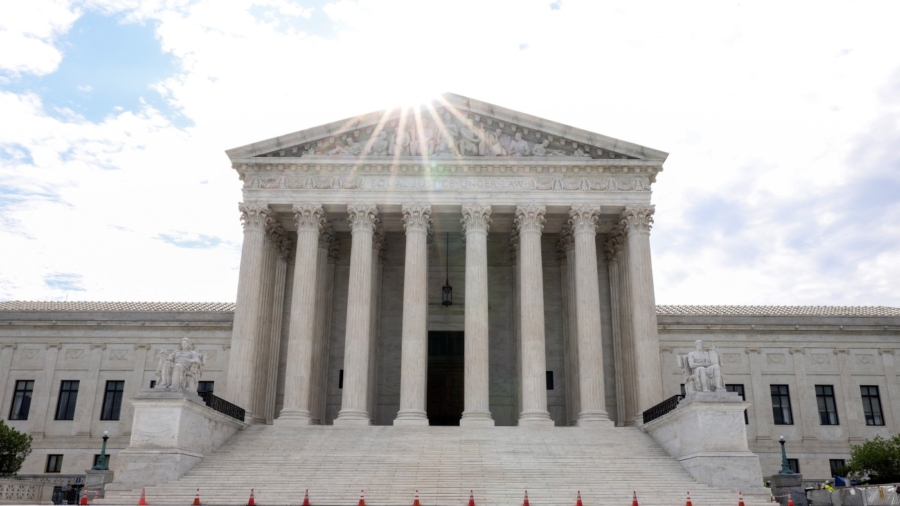The Supreme Court was skeptical of a progressive activist’s argument that he should be allowed to trademark a belittling phrase targeting former President Donald Trump for use on T-shirts.
The justices heard oral arguments on Nov. 1 in Vidal v. Elster (court file 22-704). President Trump is not a party to the appeal.
The case puts the administration of President Joe Biden, a Democrat, in the unusual position of defending the interests of President Trump, who is again seeking the Republican Party’s presidential nomination for 2024. Biden is seeking reelection in 2024.
The expression “Trump Too Small” was inspired by a crude joke that Sen. Marco Rubio (R-Fla.) made during the 2016 Republican presidential primary season. Then a presidential candidate, Mr. Rubio made fun of fellow candidate Trump by saying he had “small hands.”
Mr. Rubio told supporters that Trump was “always calling me ‘little Marco.’”
“He is taller than me, he’s like 6-foot-2, which is why I don’t understand why his hands are the size of someone who is 5-foot-2,” Mr. Rubio said at the time. “Have you seen his hands? And you know what they say about men with small hands.”
The U.S. Court of Appeals for the Federal Circuit ruled in August 2022 that the U.S. Patent and Trademark Office (USPTO) was wrong to deny the trademark application of left-wing activist and lawyer Steve Elster for “Trump Too Small.”
A USPTO examining attorney had refused registration under the Lanham Act because “the use of the name ‘TRUMP’ in the proposed mark would be construed by the public as a reference to Donald Trump.” The official found that his office couldn’t register trademarks that include the name of a living person without that person’s written consent.
Mr. Elster said he filed his 2018 trademark application because he wanted to communicate that “some features of President Trump and his policies are diminutive” and because he planned to put the phrase on T-shirts, along with the phrase “Trump’s package is too small” on the back of the shirts, accompanied by examples of policy areas that supposedly matched the characterization.
Mr. Elster claimed that the USPTO violated his free speech rights under the First Amendment.
The appeals court agreed with Mr. Elster, finding the denial of the trademark application “unconstitutionally restricts free speech in violation of the First Amendment,” U.S. Solicitor General Elizabeth Prelogar noted in the petition filed with the Supreme Court.
The appeals court found that the “content-based restriction” imposed by the USPTO didn’t survive constitutional scrutiny “because the government does not have a privacy or publicity interest in restricting speech critical of government officials or public figures in the trademark context—at least absent actual malice, which is not alleged here.”
Deputy U.S. Solicitor General Malcolm Stewart told the justices on Nov. 1 that Mr. Elster’s inability to register the trademark doesn’t violate his rights.
Mr. Elster can already sell shirts bearing the “Trump Too Small” slogan without obtaining a federal trademark registration for those shirts, Mr. Stewart said.
Current policy precludes granting a trademark because doing so would give the trademark applicant “exclusive rights in another person’s name.”
The law is viewpoint-neutral, he said. The trademark office “need not and does not consider whether the mark is flattering, critical, or neutral with respect to the named individual.”
The fact that the proposed trademark “conveys a message about Donald Trump does not strengthen his constitutional claim.”
Actually, the lawyer said, approving the registration “would likely reduce the overall volume of political speech since federal trademark registration provides enhanced mechanisms for the mark owner to restrict the speech of his competitors.”
Responding to Justice Neil Gorsuch who said trademarks constitute a monopoly of sorts, Mr. Stewart said, “Here the question is not just whether Mr. Elster can use Donald Trump’s name, because he can—he can market expression that is about Donald Trump. The question is whether he can assert an exclusive right to use Donald Trump’s name and prevent his competitors from doing so.”
Justice Sonia Sotomayor also suggested Mr. Elster’s rights would not be denied by refusing to register the trademark.
“The question is, Is this an infringement on speech? And the answer is no. He can sell as many shirts with this saying, and the government’s not telling him he can’t use the phrase, he can’t sell it anywhere he wants. There’s no limitation on him selling it.”
Mr. Elster’s attorney, Jonathan Taylor, said, “The government’s interest in discouraging marks because they hurt the feelings of public figures has nothing to do with the purposes of trademark registration.”
It is unfair that “public figures may use their names on registered marks to express their own presumably positive views about themselves, but no one else can, unless they get consent,” the lawyer said.
Justice Clarence Thomas asked Mr. Taylor if his client was able to make shirts or other products now without trademark registration.
Mr. Taylor replied saying, “he can.”
“So what’s this speech precisely that is being burdened?” the justice said.
“The burden on speech is that my client is being denied important legal rights and benefits which this court has recognized for cases running now are important legal rights and benefits that are generally available to all trademark holders who pay the registration fee solely because his mark expresses a message about a public figure,” Mr. Taylor replied.
This is a developing story. This article will be updated.
From The Epoch Times


